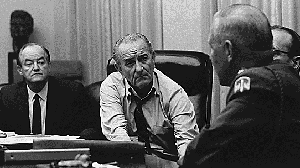Hubert H. Humphrey
"The Politics of Joy"

Hubert Humphrey.
Courtesy Hudson Library and Historical Society
This was the dilemma for Hubert H. Humphrey in 1968: As he ran for president, he had to run from the president - meaning his president, Lyndon B. Johnson.
Humphrey didn't run quite far enough.
Humphrey was Johnson's vice president. He jumped into the Democratic nomination contest after Johnson shocked the nation with news that he would not seek reelection. Johnson bowed out because of growing public unhappiness over the Vietnam War. He was also vulnerable on domestic issues, including a spiraling crime rate and worsening economy.
Humphrey announced his candidacy on April 27, 1968. U.S. Senators Eugene McCarthy of Minnesota and Robert F. Kennedy of New York were already running for the Democratic nomination. Humphrey was off to a late start, but he could count on support from party loyalists for his years as a Democratic standard bearer.
Unlike his Democratic opponents, Humphrey had been a national candidate twice before - he was a well-known commodity. That was one value of being vice president. But Humphrey had been a loyal supporter of Johnson's Vietnam policy and a champion of civil rights programs. That's where being vice president hurt. Johnson's slumping popularity dragged Humphrey down too.
Some of Humphrey's advisors encouraged him to resign as vice president. But Humphrey valued loyalty and honor - he'd stay on the team.
"It was a terrible box" for Humphrey to be in, says Ted Van Dyk, one of Humphrey's closest campaign aides in 1968. "You don't find many vice presidents marching out to disagree with their president."
Instead, Humphrey marched on like a drum major leading a band that sounded out-of-tune with the dour tenor of the times. Humphrey was an ebullient, irrepressible man. At his campaign kickoff, Humphrey dismissed claims that America was "restless" or had lost its way. Instead, Humphrey would practice "the politics of happiness, the politics of purpose, and the politics of joy."
It was an odd time for joy. Civil rights leader Martin Luther King, Jr. had been murdered in Memphis, Tennessee three weeks earlier. Cities across the nation had erupted in riots. Some 500,000 Americans were at war in Vietnam. College radicals were taking over campus buildings. Inflation clouded the economy.

Vice President Humphrey with President Lyndon Johnson in a Cabinet Room meeting, March 1968.
Photo courtesy National Archives and Records Administration.
Polls showed voters favoring Humphrey over his rival Democrats. But McCarthy and Kennedy were particularly popular with young people. At one campaign stop after another, Humphrey confronted anti-war activists. And even though the vice president had been a powerful ally of the civil rights movement, disenchanted young black people were demonstrating against him. Many saw Humphrey as LBJ's stand-in; the vice president represented the "establishment." A frequent chant was, "Dump the Hump!"
Humphrey's first campus rally was on May 3 at Kent State University in northeastern Ohio. Anticipating trouble, Humphrey praised campus activists who were fighting inequality and injustice. But he also admonished them to find real-world ways to solve social problems. "Any student that has the get up and go to make trouble for a university president," Humphrey declared, "ought to have enough courage, enough decency to go on out and help a poor kid get a break in life."
A few minutes later, a group of Kent State students - many of them black - silently walked out on Humphrey's speech. The rest of the crowd booed the protestors and cheered Humphrey. But the event revealed some of the key political obstacles Humphrey faced.
Media coverage of the Kent State rally - even the positive stories - played the student walkout prominently. It was the first of many events where placards and hecklers dogged the vice president. Campaign aide Van Dyk remembers Humphrey staffers thinking, "The only thing being covered by the media are demonstrations and disruptions. We're not getting through with our own message."
soundFile: "http://download.publicradio.org/podcast/americanradioworks/features/campaign68/hhh_kent_tv_64.mp3", titles: "Media coverage of Humphrey's Kent State rally", remaining:"yes" });Continue to part 2